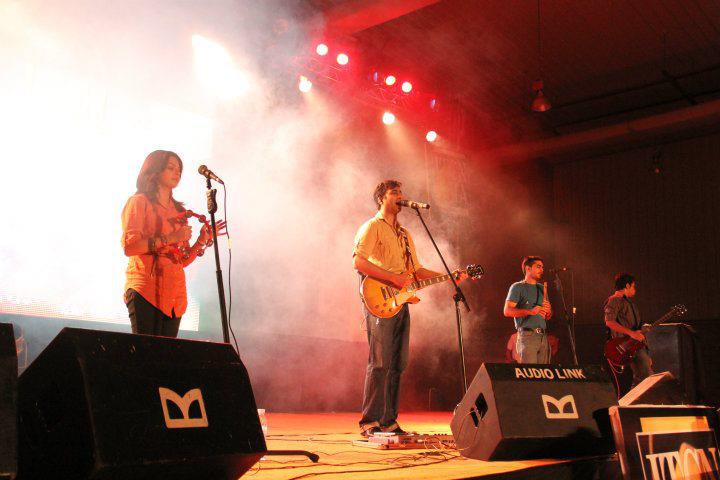Laal is one of Pakistan’s most popular bands. To the ire of the Pakistani government, it’s known for being vocally, unapologetically secular—so much that the Pakistan Telecommunications Authority (PTA), the country’s governing board for telecommunications, decided to block access to its Facebook page earlier this month. After invoking protest and anger from many netizens, the government lifted the block on Laal’s page.
Similar controversy arose last month arose when the PTA asked Twitter to block access to a number of tweets they cast as unethical and obscene. To the PTA, these tweets defied the country’s blasphemy laws. These ranged from individual tweets, such as ones containing visualizations of Muhammad, to whole Twitter feeds, like that of Duke University pornstar Belle Knox (Knox herself spoke out against the blocks). Twitter complied with these requests.
The company, which reviews censorship requests on a country-by-country basis, justified the blocks by claiming it was more acceptable to block specific tweets than it was to block access to the site as a whole. This past week, after encountering civic resistance at home and abroad, Twitter decided to restore access to the tweets within the country.

Laal performing in Karachi in 2011; via Wikimedia Commons.
Both cases recall a debate that has frightened media activists in Pakistan in the wake of the Snowden revelations. How do Pakistan’s blasphemy laws, which date back as far as the 1860s, extend to the Internet? To what extent are these laws, steeped in Pakistan’s history, being used to justify censorship?
The answers to these questions have escaped Pakistani netizens for years now. Pakistan’s Penal Code defines blasphemy in broad terms, and the laws have gone through many iterations dating as far back as the 1860s. For decades, though, civic opposition to the laws has remained strong, especially beginning in the 1980s. As Pakistan’s citizens have moved online, these blasphemy laws have been used as justification for restricting access to tweets, Facebook posts, and YouTube videos. They’ve also been used to justify arrests, assassination attempts, and murders.
The initial decisions to block social media content ignited furor and criticism from civic groups both within and outside of Pakistan. Press freedom NGO Bolo Bhi questioned the legitimacy of giving the PTA power to call for restrictions of content. Activists both within and outside of Pakistan launched a hashtag campaign, #TwitterTheocracy, to mobilize against this censorship. Some netizens criticized Twitter for abandoning its fundamental ethos of protecting free speech, while others, like Richard Dawkins, found it curious that Twitter would side with the country’s age-old blasphemy laws.
The main reason to be on twitter is the freedom of speech. Take that away and it’s just another useless application. #TwitterTheocracy
— Anakim (@Im_Atheist) June 11, 2014
Is Pakistan really a failed state? Debatable but anyway its absurd blasphemy laws don’t deserve support from Twitter #TwitterTheocracy
— Richard Dawkins (@RichardDawkins) June 10, 2014
The campaign worked. In a statement reposted on Chilling Effects, Twitter explained that a re-examination of requests prompted the restoration of access on June 17.
To media freedom activists at home and abroad, Twitter’s explanation wasn’t enough. The decision to reverse the restrictions has been hailed, by Bolo Bhi, as something of a minor victory—minor if only because of the ambiguous terms under which Twitter blocked access to the content in the first place.
Media practitioners within Pakistan fear that restrictions of this kind may be due to a new cultural stigma engendered by the Snowden revelations. Snowden’s leaks have led many Pakistani conservatives to cast freedom of expression as a sort of undesirable, neo-colonialist Western conceit. In a letter published by the Committee to Protect Journalists, Sana Saleem of Bolo Bhi explained the damning effects Snowden’s revelations have had on netizens in Pakistan, where the government is trying in earnest to replicate NSA’s model of censorship and surveillance. Pakistan’s government has drafted provisions for an allegedly draconian Cybercrime Law, while the country’s Supreme Court has suggested merging the PTA with Pakistan’s Electronic Media Regulatory Authority (PEMRA), meaning that social media now be understood as broadcast media. This would subject social media to the same monitoring restrictions as those governing broadcast media. This is the precise justification the PTA used in 2012 when it blocked YouTube, after the controversially Islamophobic Innocence of Muslims made its way onto the sharing site.
To activists and media freedom advocates like Saleem, the Snowden revelations have had the opposite desired effect upon freedom of expression in Pakistan. The state and its actors are now more inclined to monitor what its citizens do online, particularly on social media outlets headquartered in the Western world. If Twitter is the least of many evils—some activists point out that Facebook and YouTube regularly comply with more pervasive government censorship calls – its country-by-country censorship process is still cause for alarm for many of Pakistan’s media freedom activists.
